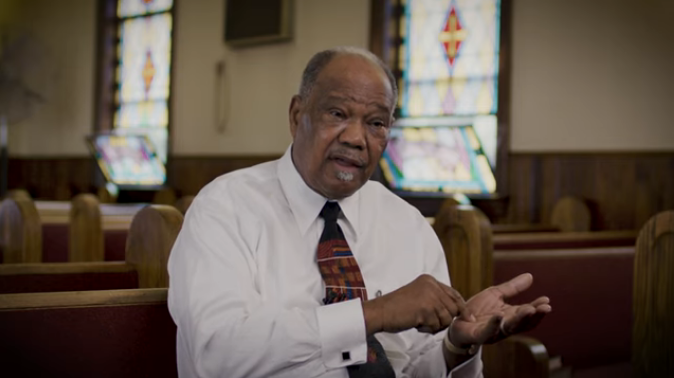
When speaking about the civil rights movement, the Rev. Edward Corley of Mt. Olive Baptist Church in Manhasset reflected on the words of the Rev. Martin Luther King Jr.: “Injustice anywhere is a threat to justice everywhere.”
“We can teach the youth to not waste your importance, and to not waste your gifts, and to use what you have to make a difference in the world,” Corley said. “You don’t want to leave here without making that difference, and letting somebody know how significant you are, and how significant they are.”
Corley has been the pastor at the Mt. Olive Baptist Church for over 45 years and was one of the 10 people that the Town of North Hempstead highlighted in a series of videotaped interviews on the civil rights movement in North Hempstead.
In addition to Corley, the profiles feature Rabbi Jerome Davidson of Temple Beth-El, Dr. Hazel N. Dukes, Town Councilwoman Lee Seeman, Bernice Roberts, Alan Reff, Bernice Sims, Marge Rogatz, Peter Kornblum and Saul Weinstein.
The interviews, which vary in length, highlight the activists’ involvement during the movement in the 1960s and 70s.
“Nassau County has been tagged as the most racist county in the world, with what was taking place,” said Corley. “I began to realize as I read, especially as I got older, that I could see a whole lot of problems taking place here.”
Corley’s impact in the community goes beyond his work in the congregation and developing relationships with African-American activists such as the Rev. Al Sharpton. After spending 16 years as a social studies teacher at Great Neck South High School, he received his Master’s in Social Work from Yeshiva University.
His connections with the Jewish community on Long Island stem from working with Davidson in creating black-Jewish dialogue. The dialogue led to a joint effort by members of both congregations to combat injustice at that time.
“The Judaic-Christian link from the Bible, we believe that we are linked on a journey together,” Corley explained. “It strengthened my bond and my understanding that there are people that care for the same things you care for.”
Along with Corley, Davidson has been a longstanding activist in the town and served as senior rabbi for Temple Beth-El of Great Neck for 35 years. He was an active member of the Committee on Human Rights, which focused on local issues and exploring ways for the Jewish community to aid with housing and economic issues.
“There was that kind of self-imposed segregation because of the economy,” Davidson said. “Aside from being an active member of the committee, I was anxious to speak with young people in the congregation on the importance of the tolerance of other races and religions.”
The two were instrumental in aid efforts in which members of the temple with medical backgrounds treated members of the Baptist Church at no cost.
Their joint efforts also resulted in getting Dr. King to visit Temple Beth-El in 1968. King was a prominent member of a panel of African-American activists that discussed why the country needed activists for the civil rights movement and called the Great Neck community to action.
“He was spellbinding in what he said,” Davidson recalled. “It was an amazing thing, and the speeches were all eloquent. And everyone there became very sympathetic to the movement.”
The collection of personal accounts is one of two town projects that were funded by a $50,000 grant that the town received in 2017 from the National Parks Service.
“Oral histories help us preserve eyewitness accounts of major turning points in our nation’s past,” said North Hempstead Town Supervisor Judi Bosworth. “The people included in our civil rights oral history library have given us a wonderful gift, and we’re so grateful to them for sharing their stories about the challenges they faced, and the courageous actions they took.”
All of the interviews can be found on https://www.mynhtv.com/civilrights.






